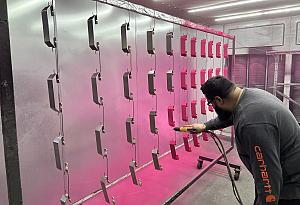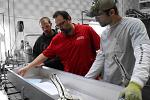- FMA
- The Fabricator
- FABTECH
- Canadian Metalworking
Categories
- Additive Manufacturing
- Aluminum Welding
- Arc Welding
- Assembly and Joining
- Automation and Robotics
- Bending and Forming
- Consumables
- Cutting and Weld Prep
- Electric Vehicles
- En Español
- Finishing
- Hydroforming
- Laser Cutting
- Laser Welding
- Machining
- Manufacturing Software
- Materials Handling
- Metals/Materials
- Oxyfuel Cutting
- Plasma Cutting
- Power Tools
- Punching and Other Holemaking
- Roll Forming
- Safety
- Sawing
- Shearing
- Shop Management
- Testing and Measuring
- Tube and Pipe Fabrication
- Tube and Pipe Production
- Waterjet Cutting
Industry Directory
Webcasts
Podcasts
FAB 40
Advertise
Subscribe
Account Login
Search
Workplace stress—Part 1
- By Vicki Bell
- July 24, 2003
- Article
- Safety
 |
Among the many definitions of stress in The American Heritage Dictionary of the English Languageis "A mentally or emotionally disruptive or upsetting condition occurring in response to adverse external influences and capable of affecting physical health, usually characterized by increased heart rate, a rise in blood pressure, muscular tension, irritability, and depression."
This definition is accurate but limited. What about internal stress that we place upon ourselves because of assumptions that may or may not be true and fears about things that may or may not come to pass?
Stressing for a Living
The workplace is rife with external stressors and opportunities for internal stressors. The current economic climate, in which workers at all levels are concerned about job security and fearful that if they lose their current positions they may not find another, is creating stressed-based organizations. Company layoffs have increased the work loads for remaining employees, who have the added burden of worrying that the next layoff is just around the corner. Workers from upper management to the very bottom of the organizational chart are walking around with long faces. Physical ailments are increasing, and on-the-job injuries can result when a worker suffers from stress.
The National Institute for Occupational Safety and Health (NIOSH) has published a booklet,Stress At Work, that defines job stress as "the harmful physical and emotional responses that occur when the requirements of the job do not match the capabilities, resources, or needs of the worker. Job stress can lead to poor health and even injury.
"The concept of job stress often is confused with challenge, but these concepts are not the same. Challenge energizes us psychologically and physically, and it motivates us to learn new skills and master our jobs. When a challenge is met, we feel relaxed and satisfied. The importance of challenge in our work lives probably is what people are referring to when they say a little bit of stress is good for you."
Peter Hanson, M.D., the author of The Joy of Stressand Stress for Success, wrote, "Stress is simply the adaptation of our bodies and minds to change; and change is about the only constant left in the workplace."According to NIOSH, "The nature of work is changing at whirlwind speed. Perhaps now more than ever before, job stress poses a threat to the health of workers, and, in turn, to the health organizations."
Alarming Statistics
NIOSH reported that:
- One-fourth of employees view their jobs as the No. 1 stressor in their lives.
- Three-fourths of employees believe the worker has more on-the-job stress than a generation ago.
- Problems at work are more strongly associated with health complaints than are any other life stressors—more so than even financial problems or family problems.
- Health care expenditures are nearly 50 percent greater for workers who report high levels of stress.
Brief, infrequent episodes of stress pose little risk. But when stressful situations remain unresolved, the body stays in a constant state of activation, which increases the wear and tear along with the risk of injury and disease.
Too Much Stress
Most people can tell you where they carry their stress—shoulders, back, stomach, head—and can identify the early warning signs of job stress—headaches, sleep disturbances, difficulty in concentrating, short temper, upset stomach, job dissatisfaction, and low morale.
Research suggests that stress plays a critical role in chronic health problems, including cardiovascular disease, musculoskeletal disorders, and psychological disorders. There's growing concern that stressful working conditions impede safe work practices and provide a breeding ground for workplace accidents and injuries. Some studies suggest a relationship between stressful working conditions and suicide, cancer, ulcers, and impaired immune function.
A Story of Stress
The following story reprinted from the NIOSH booklet illustrates the effects of job stress.
- The longer he waited, the more David worried. For weeks he had been plagued by aching muscles, loss of appetite, restless sleep, and a complete sense of exhaustion. At first he tried to ignore these problems, but eventually he became so short-tempered and irritable that his wife insisted he get a checkup. Now, sitting in the doctor's office and wondering what the verdict would be, he didn't even notice when Theresa took the seat beside him. They had been good friends when she worked in the front office at the plant, but he hadn't seen her since she left three years ago to take a job as a customer service representative. Her gentle poke in the ribs brought him around, and within minutes they were talking and gossiping as if she had never left.
- "You got out just in time," he told her. "Since the reorganization, nobody feels safe. It used to be that as long as you did your work, you had a job. That's not for sure anymore. They expect the same production rates, even though two guys are now doing the work of three. We're so backed up I'm working 12-hour shifts, six days a week. I swear I hear those machines humming in my sleep. Guys are calling in sick just to get a break. Morale is so bad they're talking about bringing in some consultant to figure out a better way to get the job done."
- "Well, I really miss you guys," she said. "I'm afraid I jumped from the frying pan into the fire. In my new job, the computer routes the calls and they never stop. I even have to schedule my bathroom breaks. All I hear the whole day are complaints from unhappy customers. I try to be helpful and sympathetic, but I can't promise anything without getting my boss's approval. Most of the time, I'm caught between what the customer wants and company policy. I'm not sure who I'm supposed to keep happy. The other reps are so uptight and tense they don't even talk to one another. We all go to our own little cubicles and stay there until quitting time. To make matters worse, my mother's health is deteriorating. If only I could use some of my sick time to look after her. No wonder I'm in here with migraine headaches and high blood pressure. A lot of the reps are seeing the employee assistance counselor and taking stress management classes, which seems to help. But sooner or later, someone will have to make some changes in the way the place is run."
Sound familiar? And did you notice that both David and Theresa alluded to changes being made—changes which possibly could result in more stress?
Not as Hopeless as It Seems
Employers and employees can do many things to manage and reduce stress. Safety and health programs can and should include a stress management component. Employers can proactively allay fears and encourage workers to talk to management about their concerns without fear of reprisal. Employees can take steps to manage and minimize the negative effects of their stress. Part II of this series will discuss stress management.
About the Author

Vicki Bell
2135 Point Blvd
Elgin, IL 60123
815-227-8209
subscribe now

The Fabricator is North America's leading magazine for the metal forming and fabricating industry. The magazine delivers the news, technical articles, and case histories that enable fabricators to do their jobs more efficiently. The Fabricator has served the industry since 1970.
start your free subscription- Stay connected from anywhere

Easily access valuable industry resources now with full access to the digital edition of The Fabricator.

Easily access valuable industry resources now with full access to the digital edition of The Welder.

Easily access valuable industry resources now with full access to the digital edition of The Tube and Pipe Journal.
- Podcasting
- Podcast:
- The Fabricator Podcast
- Published:
- 04/16/2024
- Running Time:
- 63:29
In this episode of The Fabricator Podcast, Caleb Chamberlain, co-founder and CEO of OSH Cut, discusses his company’s...
- Industry Events
16th Annual Safety Conference
- April 30 - May 1, 2024
- Elgin,
Pipe and Tube Conference
- May 21 - 22, 2024
- Omaha, NE
World-Class Roll Forming Workshop
- June 5 - 6, 2024
- Louisville, KY
Advanced Laser Application Workshop
- June 25 - 27, 2024
- Novi, MI































